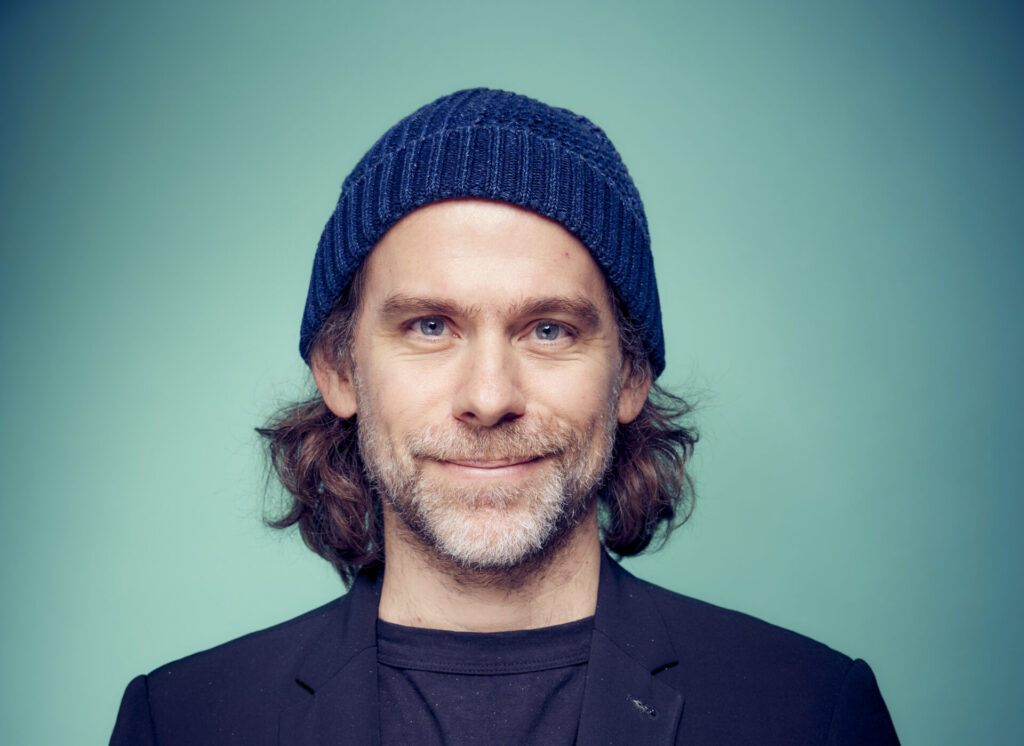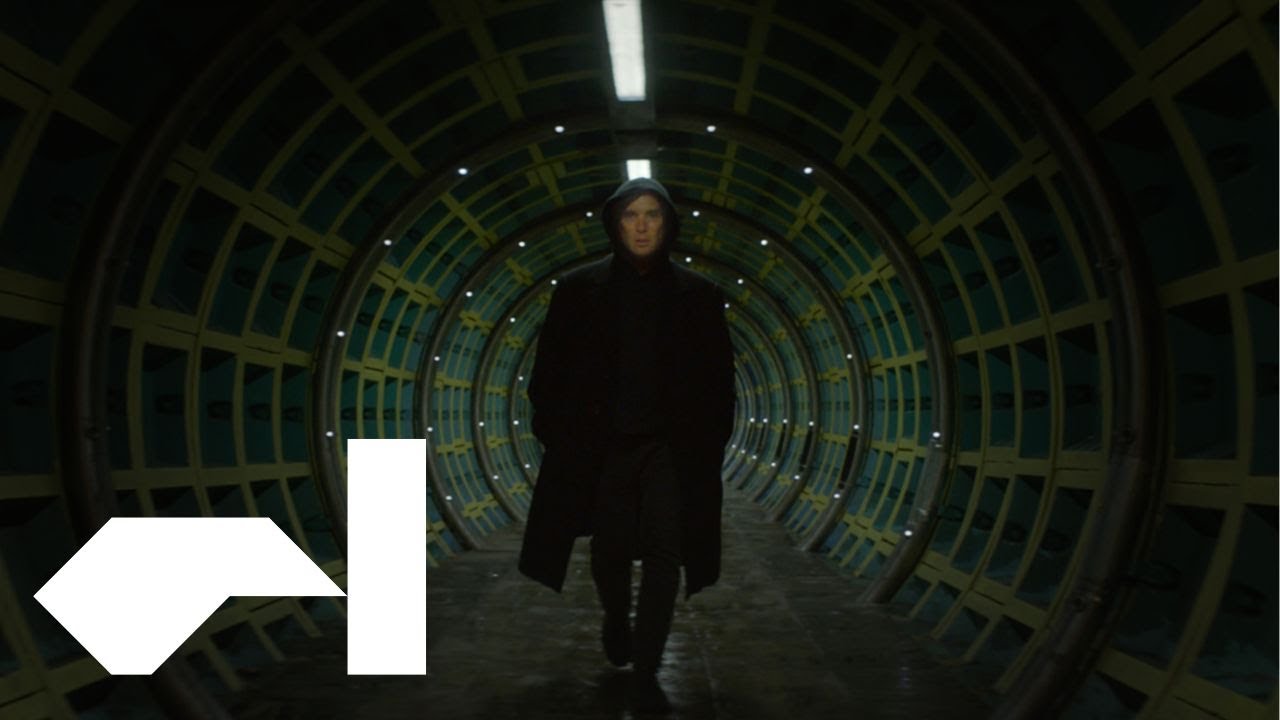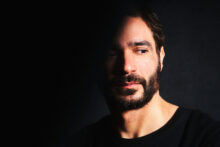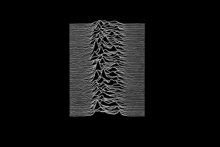Back in 2021, The National’s Bryce Dessner teamed up with twin brother Aaron and musician Jon Hopkins to score the music for the searing Cillian Murphy-starring short film, All Of This Unreal Time, adapted from the writing of Max Porter. A live score was meant to accompany the film’s premiere at the Manchester International Festival that year, however, thanks to the pandemic, everything was done remotely.
Now, finally, the film is returning to Manchester’s Aviva Studios, home of Factory International, as well as the Southbank Centre in London this week for a special screening. It will be followed by music inspired by that created by Aaron and Bryce Dessner and Hopkins, as well as a Q&A with the creative team behind it including writer Max Porter, director Aoife McArdle, the Dessners, Hopkins and producer Mary Hickson.
Says Hopkins: “This was an extraordinary project to work on. The combination of talent was rare and wonderful, and the work itself astonishingly powerful. What a group that the legendary Mary Hickson assembled. A dream to work with Aaron and Bryce Dessner on the score, and under the direction of my previous collaborator Aoife McArdle. Max Porter’s writing combined with Aoife’s imagery felt it was perfectly summing up the feeling of this era, the conflict and tragedy but also the love and hope. What we as a species are going through right now. Cillian Murphy is really the only person who could deliver these words with the power they deserved.”
All Of This Unreal Time sees Murphy deliver a cutting exploration into modern masculinity, apologising for past behaviours while trying to find hope and change for the future, despite being overwhelmed by the bleak landscape of the present. Here, Bryce Dessner tells us about how he and Aaron got involved with the project, how it was like no other that he’d ever worked on, and how he balances his solo classical and film compositional work alongside that of his day job in The National.
How did you become involved with All of This Unreal Time?
Bryce Dessner: There’s a key person in all of this called Mary Hickson who’s an Irish producer and used to run the Cork Opera House. She’s also one of my closest friends. We started a festival in Cork 10 years ago [Sounds From A Safe Harbour] that involved Cillian Murphy and my brother, Aaron. Mary is capable of pulling off the most ambitious, creative things whilst nurturing this really homemade, intuitive and welcoming collaborative environment. This project really grew out of that. Cillian, my brother and I had also done a piece at the first Sounds From A Safe Harbour in this little 200-seater burlesque theatre where Cillian is from. It was a live reading by Cillian and we scored it.
Cillian and Max are friends, and Mary had been talking to them. Then the idea came up to do this project at the Manchester International Festival and we were really involved from the beginning. Max had this text he was working on for Cillian and the idea originally was to do a live score, but it happened in like the worst summer of Covid basically. It ended up being an installation and we scored it remotely but still, this was one of the few good things that came out of that period for me. Now, we have the chance for us all to come together in one place with it – finally!
And you also worked with Jon Hopkins for the first time on this….
BD: Yes, Jon Hopkins is the third part of this, and he was someone that we knew and respected but hadn’t worked with before, so it was lovely to finally collaborate. We have a different kind of process in terms of how we do things, and it was great to explore that. We’re generating more music now actually, which is exciting. He’s just a lovely, generous collaborator.
You often talk about how inspiring literature is to your songwriting; how did that work here, having such a rich text to work with?
BD: I do find literature really inspiring in terms of musical form. In classical music, which is kind of where I come from, there’s a lot of archetypes in there. If you look at Shakespearean poetry or something, there’s a rhyme scheme. In the case of a lot of my music, and I can speak for Aaron and Jon as well, I think that poetry is especially very inspiring. As an American as well, I would say the tradition of American poetry and visual art, especially like painting and poetry from the mid-century period where the material and the language starts to affect the form – it takes its own journey – that’s a key influence. I think Max’s writing is very much like that too, where it has this kind of like labyrinth-like feeling about it, where it takes this journey and while it’s prose, it’s very poetic – gorgeously so in fact.
Cillian has said that everybody involved on this project was a complete “music nerd”.
BD: Yes! We were all on equal footing – which is not the case when you work on a film a lot of the time. We kind of dreamed up what we wanted to do and generated a lot of collaborative sounds and music early on. This was a really tightly made film and Cillian’s just the best actor in the world and brought this to life so beautifully. The way they shot it too, it just had this singular feeling. The picture [helped us] to decide on the sound ultimately, and the director was great in controlling that process in terms of helping us to real do justice to it.
The film feels especially timely now, particularly with the film’s message about masculinity…
BD: Definitely. I think that it’s wonderful for more people to see it now too. I think it’s like a lot of great literature that stands up over time, and hopefully in 30 years while it would mean something different to people, it’s still relevant. The themes it is diving into will always be relevant I think.
You’ve been doing lots of work over the last few years on multiple projects – your own solo classical work, your film and compositional work and two new albums with The National. Is it a challenge switching between multiple projects like this?
BD: The answer to that is really in my past. I grew up learning classical music. My brother and I were always doing music together, but I was kind of the one studying more formally, like first I played flute and then classical guitar followed by composition. He was playing drums and bass and then we had bands from very early on. I was studying at Yale and then did graduate school in music and in my early 20s, I was touring with people like Steve Reich and Philip Glass. Then the band was playing in small clubs in Manhattan and eventually I did too, so basically, I just never stopped doing either: I guess it’s who I am so that’s what I do.
Sometimes the institutions and the structures around these things are very different. Like tonight I’m playing in Dijon in a beautiful 18th century opera house which is very different to playing in a large outdoor venue with the band, but it’s all music that matters a lot to me. Having lived in New York City for 20 years, these things are less separate than you would think now, too. It’s very mixed up there now in terms of musicians and collaborators and all of that. There are a lot of people that have been close to me in my life, like Philip Glass and Steve Reich, who are older but also someone like Sufjan Stevens too, who’s my best friend. We have done a million projects across [different forms], we both have written a lot for ballet or we have made collaborative songs together – or when I played in his band for years and vice versa when he contributed to several of The National albums including the recent ones.
The classical work is opening up a lot more now too to collaborations from other musical spheres – and vice versa…
BD: It really is. Another thing is that in the current environment where our lives are so virtual and so online, where we have artificial intelligence and algorithms dictating taste and gatekeeping, people are coming together to experience live music in spaces more. People are going to hear an orchestra where it’s just 80 human beings playing together and it’s kind of ephemeral in a way. It’s not music that is made for a platform, like, they’re not thinking about streams. It’s become kind of a communal, spiritual home for humanity in a way. Some of those institutions can be conservative and elitist, but a lot of them are making big efforts. You know, Manchester International Festival is a great example where things happen that are really geared towards a kind of vision of the future and opening it up and trying new things. I would say that All of This Unreal Time was a version of that too. They’re changing the rules of collaborations a bit and doing something new and different.
Matt Berninger talked openly about the struggles he had finding his voice again on the last National album and how long it took him to do that. Conversely, you and Aaron were both creating non-stop at the time working on various projects. What was that dichotomy like?
BD: It goes in cycles I guess, like when the band’s busy, we all pretty much focus on that. I think it’s also extremely prolific; if you hear 11 songs on a record, there’s probably 50 others that are not on the record. I have folders and folders of songs I’ve written for the band that never made the light of day.
It’s a different process like when you’re writing a score for a solo instrument or concerto, it’s like you have to go from A to Z and every little detail has to be really clear in the score. It’s very labour intensive up front but then it’s a piece that can be performed over and over again by different orchestras. With the band, it’s different. It’s kind of the simpler the better in terms of the genesis of the idea. We make what we call sketches, and then the recording process and the production is more involved and just takes time for everyone to really centre. That’s just how we’ve done it over the years is kind of defined the heart of what it is.
It’s a long enough story now – 25 years – that each album is really different. The process has changed so much. The early records were much more sort of in the room playing all together up through Cherry Tree. After that, we had much more technology. We started before everybody had a home studio and then it was possible for everybody to have Pro Tools and we all started tinkering to the point that we also isolated ourselves a bit, where everybody was in their home environment making things and adding. We’ve also [changed] from the minimal to the maximal, like some records are highly layered, others have very simple accompaniment. What’s interesting lately is that there’s more of a live feel to what we’re doing; there’s a live record coming out soon. We have improved as a live band over the years so that energy and capturing that on the records becomes more and more important.
Are you working on any new material now?
BD: The last tour was just before the election, a month in the US, so right now we’re taking a break. We do record our sound checks where we jam together so there’s vaults of stuff, but I think right now, everybody has other things they’re doing so we’ll take some time away from it. It’s good to let it breathe for a while… you can easily get into a tunnel and it’s important for everybody to go home and be with their families and take some time to kind of breathe.
You’ve done a lot of high profile collaborations in recent years – Taylor Swift perhaps being the most famous example – but you’ve always been a band focussed on collaboration…
BD: Yeah, and I think it’s always been the way. [Taylor Swift] has been more high profile but really if you look back in the past, we’ve always had that. We always say there’s two models for a band. One is with the door closed and the shutters drawn – the old punk rock model where it’s just a band in a room and they’re fighting it out. We never really did that: there were collaborators coming in from early on. People come in and out of the studio and the records often a lot of extra voices or guests.
That’s always been really helpful to us but that said, I would say a band ultimately is more than the sum of its parts, where it’s about the alchemy, the chemistry between us, and it’s not about a famous guest star or something. It’s really what can we do together and what happens. That’s like this ancient kind of thing that just happens on stage, where you get up there and it’s like playing at Glastonbury – but it’s still the energy we had playing in the Kentucky bar in front of 30 people years ago. There’s this sort of chemistry thing that’s at the heart of it. That’s what’s interesting and that’s what keeps it alive.
One things that’s also been fun is seeing the crossover – like National fans at Taylor Swift gigs and vice versa.
BD: It’s just wonderful when people find music they like! I think similar to maybe when we met Barack Obama and he used ‘Fake Empire’ in the election – it was like this sort of surprising thing that happened that did change the audience. We’re pretty humble about all this. It’s obviously a very different dimension! But we’re here for it. It’s fun for people to find music they maybe didn’t know about before.
Are there any plans for you and Aaron to work together more soon?
BD: We’re always up for doing stuff. For years we’ve been recording kind of these acoustic guitar pieces that are instrumentals so I think we might try to formalise that a bit more. It’s sort of how we grew up playing and it’s just like us in a room together. Given how scattered we are and how like we’re turning 50 in a year or so, it feels like actually finding a bit of time to make music together again in a really kind of simple way, say two guitars or something, could be really fun. So that’s something we’re trying to find time for.
And what about the future for you; what’s next?
BD: I think that I’ve been really lucky to work on some great projects. There’s a film that’s out now called Sing Sing and I think one of the most beautiful films I’ve seen really and so getting to work on that was really such an honour. It’s music I’m really proud of. More projects like that would be great, a really small film but just with an incredible story. I think that can’t ask for more, you know, working on projects like All Of This Unreal Time too – it’s a dream.
All Of This Unreal Time will be screened at the Southbank Centre in London on 6 December, and Factory International in Manchester on 7 December, followed by a musical performance by Aaron and Bryce Dessner and Jon Hopkins.






